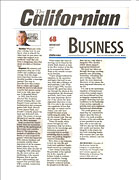Integrity
Matters
October 1, 2003
Love
makes integrity a possiblity

 Question: (S-013)
Question: (S-013)
Dear
Jim:
When
you write your column, how do you know what is ethical?
On what basis do you select the values that support your
position? I read that you were a clergyman; does that
mean you have a Christian bias?
 Response:
Response:
My
answers and responses come out of the clarity and confidence
that emerge from the single most important human relationship
possible: a marriage partner. One way to describe how
this connection to values and insight works for me is
to talk about a movie that means a great deal to my wife,
Jane, and me: A Beautiful Mind.
In
2002, Ron Howard, directed this Academy Award-winning
film. Actor Russell Crowe portrays the mathematical and
economic genius John Nash. Russell Crowe played Nash,
and Jennifer Connelly played his loyal and dedicated wife,
Alicia. The power of unconditional love was the cradle
for the film's messages.
Nash
received the shared Nobel Prize for economics in 1994
for his mathematical discoveries and contributions to
"the pioneering analysis of equilibria in the theory
of non-cooperative games," which has impacted 20th-century
business and economic activity. Most important of all,
he remembered when he won the Nobel Prize after decades
of struggling with schizophrenia, the most serious and
debilitating of the mental illnesses, that it was his
wife's understanding and support that provided him
with a context, connection and clarity.
What
makes this story so moving can be found in the words Nash
shared, at least in the film version of his life, as he
accepted the Nobel Prize at the awards ceremony in Sweden:
"I
have always believed in numbers, in the equations and
logics that lead to reason. And, after a lifetime of such
pursuits, I ask: What truly is logic? Who decides reason?
My quest has taken me through the physical, the metaphysical,
the delusional and back. And I have made the most important
discovery of my career; the most important discovery of
my life. It is only in the mysterious equations of love
that any logic or reason can be found. I am only here
tonight because of you. (addressing his wife.) You are
the reason I am. You are all my reasons. Thank You."
These
101 words, when recast through my own experience, help
me to form the basis for the knowledge and awareness essential
to restoring trust in society, rebuilding faith in institutions
and guiding integrity-centered leadership.
Here,
then, is my response to how my own life and work have
unfolded. Nash's words served as a template: I have always
believed in the potential of the individual, in the capacity
of human beings to achieve and contribute. During decades
of encouraging integrity-centered actions, for people
to be the best they can be, I ask, what is integrity?
Who decides which values support appropriate behaviors?
My
quest has taken me through theology, teaching, pastoral
care, preaching, leadership counseling and now writing.
And, I have made the most important discovery of my life.
It
is only in the mysterious equations of interpersonal connection,
mutual respect and unconditional love that an integrity-centered
life is possible. Restoring trust and confidence in the
leadership of any society, regionally or globally, rests
upon legitimate interpersonal relationships.
The
credit given to me regarding my constructive impact upon
the lives of others was made possible because of the unconditional
love provided to me by Jane, who is not only my wife but
also my best friend, role model and mentor. Her integrity
is the source for any trust-restoring leadership counsel
that I am able to provide. Indeed, I am fortunate.